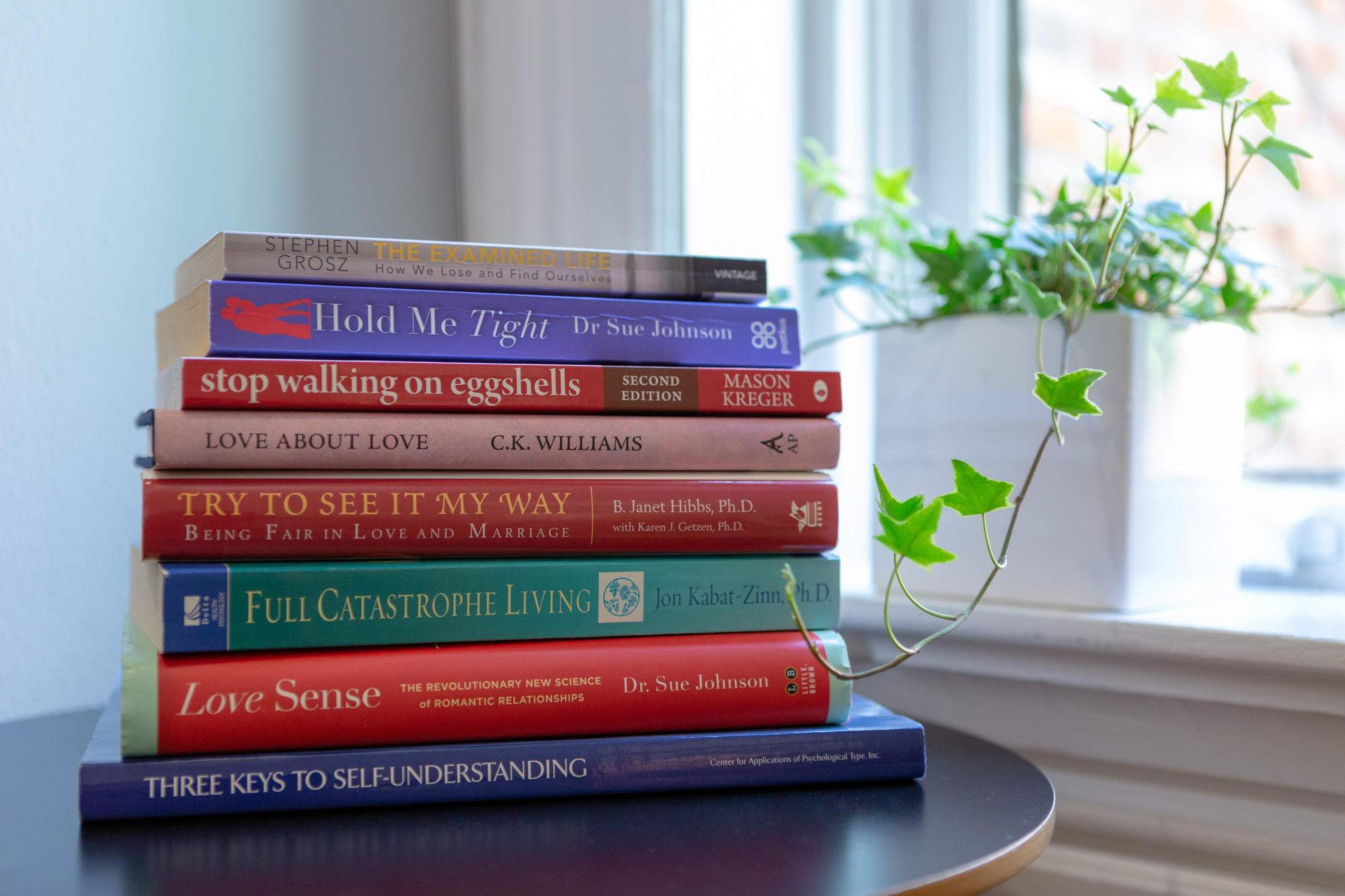Rebuild Connection and Trust with Couples Counseling in Denver
Couples counseling helps partners identify and address negative interaction cycles, improve communication, and strengthen emotional connection. At McGregor Counseling, we use evidence-based methods like Emotionally Focused Therapy (EFT), the Gottam Method, and other proven approaches. Sessions are 90 minutes. In-person and telehealth available in Denver.
Is Couples Counseling Right for Us?
If you and/or your partner are debating couples counseling, honestly evaluate if any of the following apply to your relationship:
- Recurring arguments that never really get resolved
- Feeling distant, unheard, or “on eggshells”
- Mixing up about money, chores, sex, or parenting
- Recovering after a betrayal or breach of trust
- Major life transitions causing strain
- One or both partners feeling unsure about the relationship’s future
Safety Note: If there is ongoing coercive control or intimate partner violence, traditional couples counseling is not the right setting. Your immediate safety is the priority.
What Should I Expect in Couples Therapy?
At McGregor Counseling, we take a structured approach to help you understand what’s happening between you and your partner as a couple, not just what’s happening within each of you as individuals.
In our beginning sessions, we will map your negative cycle, the patterns of triggers, emotions, and reactions that keep you stuck, so you can begin to respond differently and reconnect. Beginning sessions typically include:
- Initial consultation to confirm fit and initial goals
- Intake and goal-setting to allow your counselor to learn more about your relationship story, strengths, stressors, and hopes.
- Mapping the cycle to name the pattern, slow it down, and identify the emotional signals underneath
- Creating your personal plan, including session frequency and focus areas to help you and your partner reach your relationship goals.
Many couples choose to meet weekly to get through the initial steps and then taper as progress stabilizes. Courses of care are often short-term and the number of sessions ultimately depends your goals and desired pace.

Couples Counseling Methods Used at McGregor Counseling
Emotionally Focused Therapy (EFT)
The Gottman Method
Narrative Therapy
Imago Relationship Therapy
Positive Psychology
Analysis of Patterns of Communication
Life Stages
Founder Lynn McGregor on Couples Counseling
Working with couples is a significant part of my practice. Through my post-graduate training in Marriage and Family Therapy, I see couples through a systemic lens that helps uncover the patterns and presenting problems that were often there in some form or another early on.
In order to get to the root of these issues, I work with couples to help them identify their negative cycle and the underlying themes and emotions. Then we work together to identify and regulate their emotions, and to learn how to express them clearly to their partners.
I often work with Emotionally Focused Therapy (EFT) which is a structured approach to couples counseling that is based on the science on adult attachment and bonding. This approach is used to expand our understanding about what is happening in the relationship.
A substantial body of research outlining the effectiveness of EFT now exists. Studies show that 70 -75 % of couples working with EFT therapists move from relationship distress to recover, and approximately 90% show significant improvements.
I also work with the Gottman Method which uses counseling techniques to increase affection, understanding, and respect. This method stresses conflict management rather than conflict resolution, acknowledging that some elements of conflict are inherent in all relationships. The goal is to reframe negative conflict patterns into positive interactions and dialogue that can repair.
I can attest that in my own marriage which has lasted 36 years, we wish we would have known sooner than later some of the things we have learned. It would have saved a lot of time and unnecessary anguish.
Recommended Books for Couples
- Love is Never Enough: How Couples Can Overcome Misunderstanding, by Dr. Aaron Beck
- The 5 Love Languages, by Gary Chapman
- The Seven Principles of Making Marriage Work, by Dr. John Gottman
- What Makes Love Last, by Dr. John Gottman
- Hold Me Tight, by Dr. Sue Johnson
- Mating in Captivity, by Ester Perel
- You Are the One You’ve Been Waiting For: Applying Internal Family Systems to Intimate Relationships, By Richard Schwartz
What is Premarital Counseling?
Premarital Counseling is a specialized type of counseling that is proactive and highly useful to help couples develop a healthy foundation for their relationship. The goal of premarital counseling is not only to identify any potential areas of conflict, but also to provide couples with effective strategies for resolving differences in a way that strengthens the relationship over time – rather than the alternative in which the relationship is diminished due to avoidance of the issues.
What is Talked About in Premarital Counseling?
In premarital counseling we look at alignment in areas of:
- individual philosophies in life
- concepts of self
- levels of maturity
- aspects of preferred social engagement
- expectations
- attitudes around finances
- personality types
- personal styles
- communication and decision-making styles
- individual views of how each partner perceives the future
McGregor Counseling uses a variety of assessment formats, and provides exercises and resources to help couples learn more about themselves and each other. Our belief is that couples who decide to be proactive are more likely to get started on the right foot from the beginning. It is one of the best investments they can make with what is probably the most important decision of their lives – the commitment to another person.
McGregor Counseling has counselors certified in Prepare/Enrich, and the MBTI Interpretive Step II Assessments. Both are platforms that provide a shared language that couples can use to begin to better understand each other, and to have some of these essential conversations.
What is Discernment Couple Counseling?
Discernment Couple Counseling is for couples who are struggling to decide fi they are in or out. Should they stay, or should they go? Is it even worth trying to save the relationship? Is everyone on the same page with what they want?
The word discern means the ability to judge well. The concept of Discernment Couple Counseling, developed by William Doherty, is a time-limited approach that helps you make a thoughtful choice as to how you would like to proceed in your relationship. The typical course is 4-6 sessions.
You and your partner do not have to be aligned – the goal is to make an informed, and ideally shared decision about the best course of action for your relationship. The work involves both couple and individual sessions, as each person has to decide somewhat independently whether to work on the relationship, or move toward some type of closure.
McGregor Counseling works with couples in this format when couples have not decided together what they want to do, or when one person wants out of the relationship and the other person is motivated to work on it. Without the dedicated effort by two motivated people, there is no contract for couples therapy – and sometimes that is what needs to be determined first.
We help you work through the process of identifying and evaluating the issues for both parties, and help describe and clarify the options.

Recommended Books for Coping with and Healing from Affairs
- When Good People Have Affairs: Inside the Hearts & Minds of People in Two Relationships, by Mira Kirshenbaum
- Not Just Friends: Protect Your Relationship from Infidelity and Heal the Trauma of Betrayal, by Shirley P. Glass
- After the Affair: Healing the Pain and Rebuilding Trust when a Partner has been Unfaithful, Updated Second Edition, 2013, by Janis Abrahms Spring
- How Can I Forgive You?, by Janis Abrahms Spring
- Getting Past the Affair: A Program to Help You Cope, Heal, and Move On, by Douglas Snyder, Donald Baucom, and Kristina Coop Gordon
- Healing from Infidelity, by Michele Weiner-Davis
Can My Relationship Recover from an Affair?
Affairs comes in all forms and sizes. The way that people view an affair and its impact on a marriage can fall on a wide spectrum – from that of a superficial misstep that needs to be worked through and understood, to that of the ultimate threat to the relationship from which there seems to be no return.
Often an initial goal in counseling is to create safety and stability to manage the crisis, and foster more open and honest expression of emotions so that each partner can be heard in a more balanced way.
What are the Common Topics Discussed When Recovering from an Affiar?
We use a structured approach to meet the couple where they are, and work in a collaborative manner to provide the space and language needed to work through common themes found in recovering from an affair.
- Rebuilding trust and reducing suspicion
- Reclaiming loyalty and connections
- Regulating jealousy
- Searching for understanding
- Diminishing uncertainty
- Seeking forgiveness
- Letting go of the negative tone and desire for retribution
- Managing ambivalence and concerns about the future
- Looking to the future and coming to resolution about whether to remain together
Is There Really Hope for My Relationship After an Affair?
There are stages in the healing process, and our goal is to help couples work through these stages in the best way possible. In our experience, couples who are willing to engage in constructive conversations about what has happened, who set realistic expectations, and who come with a dedicated persistence are the ones most likely to find the clarity needed to make the best decisions moving forward. At McGregor Counseling, we have seen many couples who are able to repair and build a better relationship than they ever imagined.





